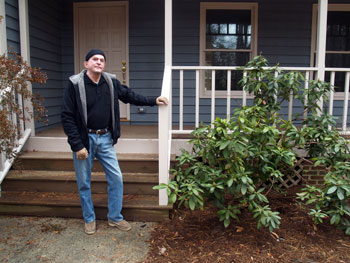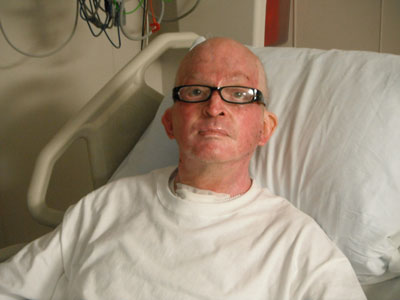Living in a different light

By Susan Dickson
Staff Writer
There are moments in time that can forever alter the course of our lives, seconds that leave us perpetually wondering “what if?†and events that permanently change the way we look at the world. March 10, 2010 brought one such moment for Kim Anderson.
It would be easy to look at the events that surrounded that night – including a fire that left 59-year-old Anderson with third-degree burns covering half his body – and deem them horribly unlucky, but Anderson, a former pessimist by nature, has chosen to view them in a different light.
“For me to have this accident, it was rotten luck,†he said. “But in some other ways, I’ve been incredibly lucky.â€
The self-employed architect had been up most of the night of March 9 finishing drawings he was to deliver the next day. With his wife, Stephanie, away on business, Anderson cooked dinner on March 10 for his two children, Drew, 18, and Emma, 15, at their home near Calvander. After dinner, he dozed off on the couch, but was awoken by his daughter, who said that a grease fire had started in the kitchen.
Anderson got Emma, Drew and the family dog, Jolene, out of the house and called 911.
While telling the story, Anderson pauses before the next part – one of those “what if†moments.
“Here’s my major mistake: I went back in.†He’d hoped to stop the fire from spreading. But when Anderson didn’t come back out, Drew crawled in to get his father.
“He basically saved my life,†Anderson said. “I remember him saying ‘Dad, we can get a new house … but I can’t get a new dad.’â€
Anderson’s state of shock prevented him from realizing the severity of his burns; even after Drew pulled him out of the house, he continued to try to fight the fire, running around back to get the hose. When Drew grabbed his dad to prevent him from trying to fight the fire, skin from Anderson’s arms deteriorated in Drew’s hands.
After emergency services arrived on the scene, paramedics took Anderson to the Jaycee Burn Center at UNC Hospitals.
“I’m very lucky to be alive, and I’m very lucky that my son was there and that the EMTs got me to the burn center in time,†he said. “We have a facility here that saved my life.â€
He would remain at that facility for the next four months.
Recovery
There is much of Anderson’s story that he doesn’t remember, and even more that he only remembers as a bizarre collage of dreams. Immediately after he arrived at the burn center, doctors put him into a medically managed coma; he wouldn’t awaken until May.
Stephanie Anderson arrived at the hospital the morning after the fire. Though she’d been briefed by doctors on her husband’s condition, nothing could prepare her for what she would see. Burn victims’ bodies often swell, and Anderson’s head was the size of a medicine ball.
“I think the scariest moment was having to walk into the room for the first time and not knowing what to expect,†she said. “He was just unrecognizable.â€
For the next two months, she spent every day at the hospital, and was present as Anderson underwent five skin-grafting surgeries. After the first couple of weeks, Stephanie Anderson knew her husband would live, and promised him they would walk out together.
“You could kind of see him emerge out of this weird body into who he was,†she said. As Anderson improved, doctors reduced his medication and slowly brought him out of his coma.
That brought on new difficulties. “When you first realize the predicament you’re in, and I can remember that very clearly because I was having trouble sleeping at night,†he said, “that’s like undergoing the trauma all over again.
“It’s suddenly very depressing,†he said. “If you don’t look at it in a certain way, you’re screwed.â€
And while Anderson did become somewhat depressed, he set off down the long road to recovery, including learning to walk again.
“At times, I was not a very good patient, I’m sure,†he said. “Physical therapy is very, very painful.
“I’m 59 years old, and I cried like a baby on a number of occasions.â€
Changes
Anderson can’t say enough about the Jaycee Burn Unit, from the surgeons to the housekeeping staff. “It’s a special unit,†he said.
When it was time for Anderson to go home, he walked out of the hospital, as his wife had promised.
His family had spent the four months of his hospitalization in a nearly empty house down the street from their former home, where they remain today. While their old house has been repaired, the Andersons don’t plan to return.
Anderson has found that his relationships with family members have changed, particularly with Drew, who saved his life.
“What do you say to your son when he says, ‘Dad, I need to borrow the car this weekend’?†he said. “It’s interesting. [Our relationship] will continue to be changed for a long time, and we’re both dealing with it in our own way.â€
Meanwhile, Anderson continues to spend several days a week in therapy.
“Just in the last six weeks, I’ve made really, really good strides in my physical therapy and occupational therapy,†he said. “It’s tremendously frustrating, and tremendously humbling. … There are some things that I probably will not be able to do ever again,†like play the guitar. But, “I love to fish, and I now can fish again,†he said, recalling an annual trip to the Outer Banks over Thanksgiving.
Most of all, Anderson has changed the way he looks at little things.
“There’s an incredible amount of stuff that you used to take for granted that you don’t take for granted anymore†– simple tasks, like tying your shoes or showering.
What if, and luck
Anderson does sometimes wonder “what if†regarding the events of that night: What if he hadn’t gone back into the house, what if his son hadn’t come to get him, what if he hadn’t lived near an excellent burn center?
“What if I did not have the support of all the people?†he said. “I could choose to think that I was really unlucky … but in being unlucky, I was incredibly lucky.â€
Though Anderson’s lost much of his architecture business, he manages to find the positive.
“Here again, I’m incredibly lucky.†Because demand for his type of work had dropped off sharply before the fire, “It was the most fortuitous time for it to happen to me.â€
Though part of his right index finger had to be amputated, Anderson said, “It was very easy for me to learn how to use a mouse left-handed. I could do work now, if there was any work to be done.â€
Physically, Anderson said, he is very lucky.
“Almost all of the damage is under my clothing,†he said. “Two years from now, to look at me, you would never know that I had had an accident.
“You can look at it all different ways,†he continued. “This was an event that was destined to be meaningful to me and everyone else that was involved.â€


